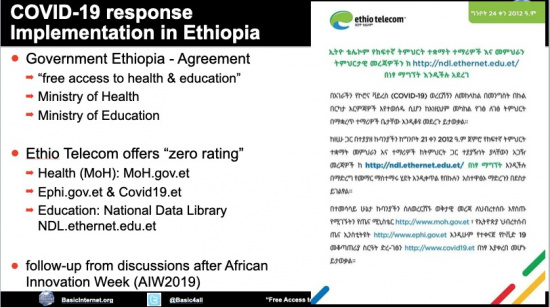BasicInternet:Ethiopia Education Partnership Jun2020
From its-wiki.no
Revision as of 07:25, 8 July 2020 by Josef.Noll (Talk | contribs)
| Ethiopia Education Partnership Jun2020 | |||||||
|---|---|---|---|---|---|---|---|
|
BasicInternet:Ethiopia Education Partnership Jun2020
| Title | BasicInternet:Ethiopia_Education_Partnership_Jun2020 |
|---|---|
| Place | zoom.basicinternet.no |
| Date, Time | 2020/06/04, 0900-1030 |
| Contact Person | Josef.Noll |
| Participants | Brenda Jimris-Rekve, Addisalem Genta Gemiya, Tigist S Hussen, Carlos Rey-Moreno, Josephine Miliza, Payee Nethalem, Getnet Tadele, Fazil Terefe |
| related to Project | BasicInternet |
| Keywords |
| this page was created by Special:FormEdit/Meeting, and can be edited by Special:FormEdit/Meeting/BasicInternet:Ethiopia Education Partnership Jun2020 |
| Category:Meeting |
Topics discussed
- Follow-up of BasicInternet:Ethiopia_Education_Partnership_May2020
- Answering specific questions on technology and funding
- Preparing for proposal writing & ways to achieve funding
Background
MoE has the ambition in connecting all 3500 secondary schools within 2020, and all primary schools thereafter. We (EyeNetworks, IBA Ethiopia, BasicInternet created an application to connect 500 schools, and help the government to achieve the goals. See details at BasicInternet:Ethiopia_Education_Partnership_May2020
Follow-up questions
-
Q1) Which of the following supports can BIS provide our schools and nearby communities?
- a) connectivity costs (infrastructure, software/platforms…)
- b) digital devices (E.g computers/chrome books, headphones, LCD projectors… for our digital learning hubs and for using digital contents in the classrooms)
- c) selection of curriculum and age aligned, culturally appropriate contents in different formats)
- d) Developing policies of ethical and proper use of contents and devices)
- e) training our staff and teachers i
- f) developing tools and systems for monitoring use and measuring the impact of the technology on student learning outcomes, improved teacher capacity and other outcome targets (including those at community level)
- g) Making uninterrupted power available (solar) so that children and staff have regular access to contents including during weekends
- A1) The Basic Internet Foundation has the main focus on connectivity by providing a minimum viable solution, bringing the operational costs (OPEX) for Internet connectivity down to less than 20 USD/month for an information spot. Though the Foundation would like to be able to join for funding 1a...1g, we don't have funds to support. Thus, the solution is to identify potential supporters and prepare a common proposal.
- Regarding 1c) Our common goal is to establish a local platform with educational content, and the free access to the National Knowledge Portal, including the [ https://digitalpublicgoods.net/ UNICEF initiative on Digital Public Goods.]
- Regarding 1f) As of now, we have implemented a local network control server (LNCC), which is used to determine for free and premium content. The functionality is performed through a “whitelist” (what is open), “blacklist” (forbidden, e.g. *porn*, denied), thus allowing for protection of content, and opening for free access. On the long term, we favour the free access to information through an “Internet Lite” standard, see: https://docs.google.com/document/d/1ySsYHX7dBSEsWjGyUpoXUQrFXRSsZNlyQ1UxSuyRwE8/edit
: Regarding 1g) Our equipment runs fine on a 120 W solar panel - as used in Esilalei (TZ)
Follow up on 1c) The idea is to create a village/school/community platform, where our prototype at Yeboo.comis used as an example for access to health.
- Together with the community we work on the design of the community platform: https://docs.google.com/document/d/1Xcbx2iHGaleRRjQ-Y6nDu3Dr254gQtZNS507Qh1kH2A/edit?usp=sharing
- RACHEL can be implemented on such a platform
- we shoudl elaborate on Kolibri (used in Malawi and other places - Josephine) and other solutions for "constrained environments", see link provided in 1d)
- Q
2) What does BasicInternet expect from our NGO and our local partners what we closely work with (the education offices, schools, communities, academic institutions) to get the project started and sustain the services?
- A2) We ask our partners with the contacts on ground, and to contribute with the installation. The usual way ahead is that we first establish a Memorandum of Understanding (MoU), and in that define the focus of the work. Then we outline further into specific project proposals. Brenda manages the partner programme.
- Q3) What kind of timeline do you think is realistic to translate ideas into action (get the schools connected)?
- A3) The proposal for school connectivity is provided to the Government of Norway. Though, decisions take time - we don't know how long. Thus, we started in parallel to lobby for [ https://docs.google.com/document/d/18aln9OlCN-HvjlgaDXWfZeQvKogR_XbTNrNprfNwqBc/edit?usp=sharing the free access to the National Knowledge Portal (GDocs)]as a strategy for governments. Regarding proposals, we are are public on our activities BasicInternet:Ongoing
Way ahead
- the proof of concept was performed by connected Koye Secondary school
- the proposal to the Government of Norway addresses connectivity of 500 schools
Specific tasks
- Identify opportunities for collaboration (open calls, see BasicInternet:Ongoing )
- Establish a proposal for connecting the next 14 schools, see BasicInternet:How_To

